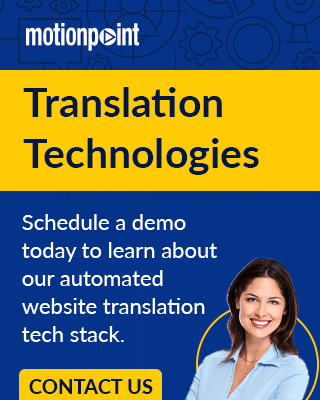Entering the global marketplace can unlock your business growth. First, you must communicate well with your audience. An interconnected world needs website content translation and localization to satisfy customer needs wherever they live.
Research shows that translating a website into seven languages can reach 80% of global online shoppers. These languages include Chinese, Japanese, Spanish, German, French, Portuguese, Italian, and English.
Translating a website into multiple languages can help you reach a wider audience. This can lead to increased online sales and global brand recognition. So how can you ensure an investment in multilingual websites will keep your business competitive? The following method can help!
Wat is continue vertaling?
Continuous translation (or continuous localization) is when content is translated and localized constantly through software, instead of in separate stages.
Fueled by global growth, companies nowadays want to release content in multiple languages and formats. Modern content management tools make it possible to update content anytime and deploy it easily online. Continuous translation automatically collects text as changes happen and assigns "segments" of new content for translation. It enables you to achieve a constant flow of updated information when there's a need for new translation or localization.
The Process of Continuous Translation
Continuous translation is an approach to translating content that relies on continual, simultaneous processes that create effective results. By using vertaaltechnologie voor websites, continuous translation is a seamless way to keep websites optimized. Here’s how the process works:
Base Translation and Localization is Complete
MotionPoint's technology continually "crawls" websites for translatable content, both as a website is initially translated and when updates are required. As a result, the technology learns the initial content and makes adjustments quickly.
What Updating Content on Your Site Means
Translation technology automatically picks it up for translation and localization when new content is ready. Continuous translation uses the element of automated website translation technology to keep content up-to-date. As a result, you do not have to manually provide updated content. Instead, the technology works automatically and independently to eliminate the time-consuming process.
The content updating process can occur through more than one system. Content Management Systems (CMS) are powerful tools that help create and manage websites in multiple languages for different markets. However, they also have limitations that affect content translation.
For example, CMS connectors send entire pages of content for translation and localization instead of picking out new content. This is where proxy-based technology comes in. Proxy-based solutions complement CMS and don’t replace them – instead, the proxy system automatically handles all translation workflows.
Content Translation and Localization
The next step in the process involves translating and localizing website content based on your business needs and budget.
- Machine Translation (MT) uses artificial intelligence (AI) to translate content without any human input automatically. MT is quick, translating millions of words instantly and getting better as more content is is translated. MT also works with CMSs to organize and tag content. That makes it possible to retain organization and context as content is translated into multiple languages.
- Human Translation (HT) isn’t about simple translation. Instead, HT uses critical thinking and cultural awareness to convey messages that resonate with each market's audience. MotionPoint considers HT as "continuous translation" because the automated side of its proxy is constantly crawling for new content. MotionPoint’s proxy technology sends content through HT and updates the site automatically once it’s complete and checked for accuracy.
Typically, human translation is used for high traffic pages where messaging is crucial, while machine translation is utilized for less brand-sensitive content. Approaches to the translation process can differ, however.
For example, some customers only want their content looked at by human eyes. MotionPoint supports businesses by creating a hybrid continuous translation and localization model, depending on customer preferences.
Continuous Translation Technology
Technology that supports continuous translation does so from beginning to end. First, translation memory (TM) is a database that stores both original and translated content in segments. TM is used to eliminate any redundant translation of relevant, already translated segments.
Once something is translated, it is saved in TM and reused as needed. MotionPoint’s e-book on translation memory covers the function and benefits of this unique technology.
Neural machine translation (NMT) keeps the translation process moving quickly. NMT is a cutting-edge, automated, AI-powered translation service to overcome common weaknesses of classical translation methods. NMT takes advantage of deep "learning" and leverages existing bilingual databases that contribute to the constant improvement of its efficiency, speed, and quality. Our neural machine translation e-book explains more about this powerful translation functionality.
Finally, during the translation process, quality assurance brings all the work together to ensure that updates are completed successfully. One customer may need their website translated and localized for different languages and cultures. Quality assurance involves linguistic and design reviews to guarantee accuracy and effectiveness. This is crucial for reviewing and correcting the TM for best use cases, terminology application, and content context.
Benefits of Continuous Website Translation
Continuous translation takes the stress out of updating content. Updates are done quickly and at the same time. The number of languages and localizations doesn’t affect how long the translation process will take. This is different than traditional methods of web translation, which can slow down the content creation process.
Additionally, global customers will view website updates in their preferred language, which keeps user experience high and business running smoothly. When your website is fully updated, your website will not suffer from gaps in search engine optimization (SEO) either. Finally, continuous translation can be a more financially efficient option than paying for a price-per-word translation model.
Choose a Translation Partner That Understands Your Needs
Continuous translation is a time-saving, technology-driven part of maintaining multilingual websites to allow businesses to grow wherever they want to be. Having a translation partner who understands your business needs is crucial for maintaining multilingual websites and competing globally.
MotionPoint is a localization company that successfully strategizes and implements multilingual website translation and localization for your business. MotionPoint’s advanced technologies and efficient, cost-saving continuous translation systems will create world-class content to support your customers globally.
Laatst bijgewerkt op 28 maart 2022

